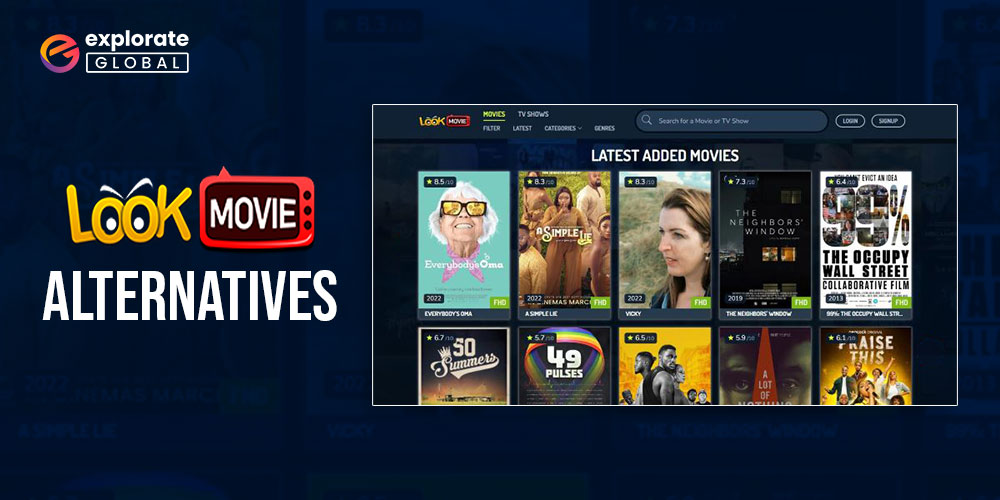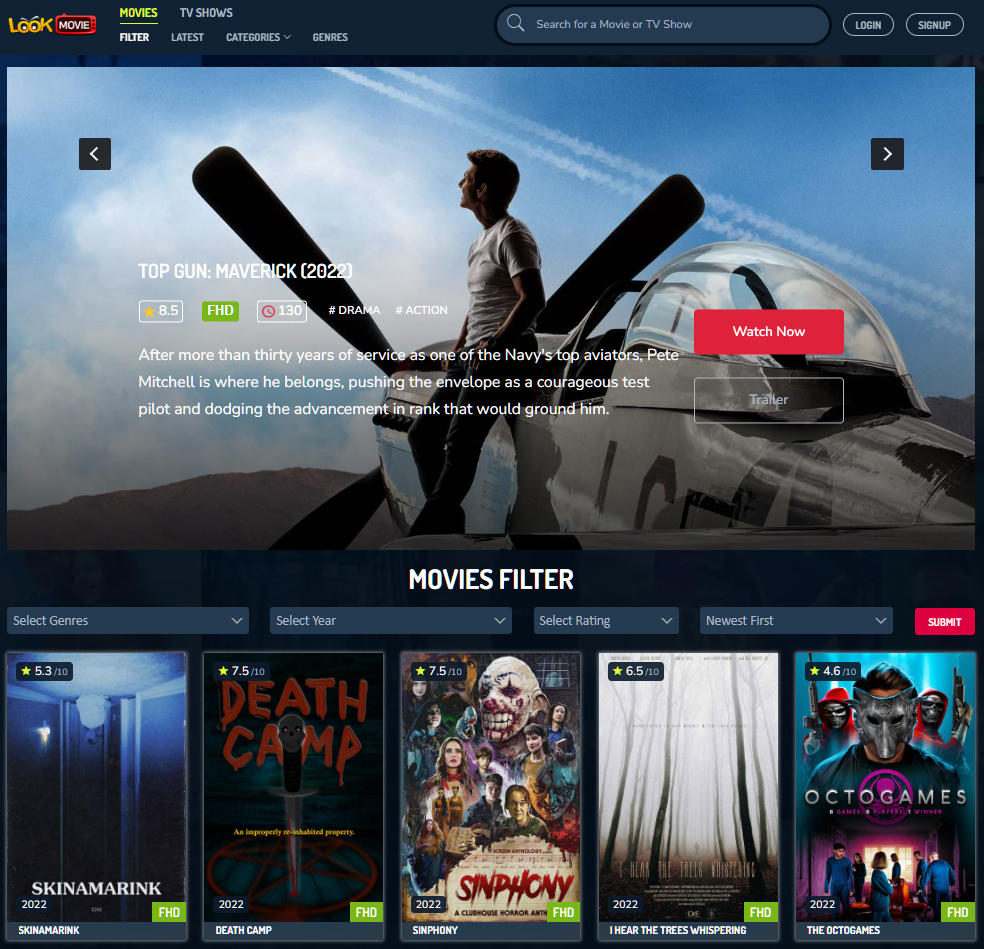Best Lookmovie2 Alternatives: Watch Free Movies Now!
Is the allure of free streaming truly as harmless as it seems? The widespread accessibility of platforms like lookmovie2, while offering tempting access to movies and television shows, often masks a complex web of legal and ethical considerations that users should not ignore.
The digital landscape has transformed the way we consume entertainment. Gone are the days when movie-goers were limited by the schedules of local cinemas, or viewers by the offerings of cable television. Streaming services, initially hailed as revolutionaries, quickly became ubiquitous, and the subsequent rise of "pirate" streaming sites, like lookmovie2, further upended the entertainment industry's established order. These platforms capitalize on the desire for readily available, cost-free content, creating a user experience thats undeniably appealing to those with limited budgets or a casual interest in the latest releases. But, the facade of effortless entertainment conceals an intricate ecosystem, built on a foundation of copyright infringement and ethical ambiguity. The very essence of these services, the movies and shows they offer, are often acquired and distributed without the proper authorization of the studios, production companies, and individuals involved in their creation. This inherent illegality casts a long shadow over the seemingly innocuous act of clicking "play". The user experience, carefully crafted to mimic legitimate streaming services, is frequently marred by intrusive advertisements, malicious software threats, and the potential for exposure to legal repercussions. The convenience of accessing lookmovie2 must therefore be weighed against the risks that come with it.
The appeal is undeniable. The promise of watching the latest blockbuster, or binge-watching a critically acclaimed series, without paying a subscription fee, is a powerful draw. This convenience, however, comes at a price. The studios and creatives whose work is being exploited lose revenue, hindering the growth of the industry, and ultimately, diminishing the quality and variety of content available to legitimate viewers. Furthermore, the safety of the user is often compromised. These sites are frequently riddled with malware, posing a threat to personal data and digital security. Pop-up ads, redirects, and hidden downloads are all common elements, designed to generate income for the operators of these illicit platforms, often at the expense of the user's peace of mind and device's functionality. The temptation to explore the offerings of a site like lookmovie2, therefore, should be tempered by a careful consideration of the ethical, legal, and practical ramifications that may ensue.
The entertainment industry is a complex and multifaceted one, a dynamic ecosystem where the creation, distribution, and consumption of content are intertwined. The traditional model, built around theaters, television networks, and later, legitimate streaming services, relies on revenue streams to support the production of new movies and television shows. Piracy, in all its forms, disrupts this established system, undermining the financial incentives that drive creativity and innovation. When a user streams a movie on lookmovie2, they are, in effect, depriving the filmmakers, actors, writers, and all the other professionals involved in its production, of the compensation they deserve. This loss of revenue can lead to reduced budgets for future projects, fewer opportunities for emerging talent, and a decline in the overall quality of the entertainment we consume. The impact extends beyond mere financial concerns; the act of piracy implicitly devalues the creative work of countless individuals, undermining the cultural significance of movies and television. This is not just an abstract ethical dilemma; it is a direct assault on the people and institutions that make the entertainment industry possible.
The legal consequences of accessing copyrighted material through sites like lookmovie2 vary depending on jurisdiction, but the risk of facing fines, civil lawsuits, or even criminal charges, cannot be dismissed. While the individual user may not be the primary target, the potential exists, particularly if they download, distribute, or otherwise engage with content that is clearly infringing on copyright. Moreover, the use of these platforms can expose users to security risks. Cybercriminals often exploit the vulnerabilities of these sites to distribute malware, steal personal information, and even gain access to sensitive financial data. The lack of security measures on these platforms makes them ideal targets for malicious actors. The casual user, lured by the promise of free entertainment, can inadvertently become a victim of cybercrime, facing the consequences of identity theft, financial fraud, and the loss of valuable data.
The fight against piracy is an ongoing battle, and the entertainment industry is constantly developing new strategies to combat illegal streaming. Technological advancements, such as digital watermarks and sophisticated content protection systems, are employed to trace and identify instances of copyright infringement. Legal action is pursued against operators of pirate sites, and public awareness campaigns are launched to educate consumers about the risks associated with illegal streaming. The evolution of the internet has made piracy more difficult to police, but the industry is fighting to maintain control over its content, and protect its rights.
A key element in this ongoing struggle is the role of consumer behavior. As audiences become increasingly aware of the ethical and legal implications of illegal streaming, they are making more informed choices. The popularity of legitimate streaming services is a testament to this trend. Companies such as Netflix, Disney+, and Amazon Prime Video have responded to the demand for accessible content by offering a wide range of movies and television shows at competitive prices. This provides users with a convenient, legal, and secure way to enjoy the entertainment they want. The growth of these services demonstrates that the desire for content does not necessarily equate to a willingness to participate in illegal activity. The availability of readily accessible, affordable, and legal streaming options allows consumers to support the entertainment industry while adhering to copyright laws.
Furthermore, the rise of platforms such as lookmovie2 has inadvertently driven the development of anti-piracy measures by major entertainment industry companies. Sophisticated content protection and monitoring systems are continually being refined to combat piracy. The increasing sophistication of these countermeasures underscores the resourcefulness of the industry in protecting its intellectual property. As the fight continues, the industry aims to maintain a balance between making content available to its customers while safeguarding their copyright and preventing unauthorized distribution. This constant cat-and-mouse game emphasizes the importance of the legitimate services in providing consumers with a trusted alternative. As technologies progress, it becomes easier for legitimate services to ensure content is available and safe.
The shift towards legitimate streaming reflects a changing consumer landscape. The availability of a wide array of content, combined with enhanced user experiences and user-friendly interfaces, has contributed to the growth of legitimate streaming services. These services are constantly evolving to keep pace with consumer demand, offering a range of viewing options, from on-demand viewing to personalized recommendations. The focus on creating a seamless, safe, and enjoyable experience, in conjunction with a commitment to respecting copyright laws, demonstrates how the entertainment industry is adapting to the digital age. This has shifted how consumers are consuming and, moreover, how the content is being presented.
The future of entertainment depends on a balance between accessibility and respect for intellectual property rights. Sites like lookmovie2 highlight the enduring desire of audiences to access a wide variety of content, but they also underscore the importance of finding sustainable and ethical solutions to this need. Legitimate streaming services are key components of this solution. These services, when operated under proper licensing agreements, provide the framework for a vibrant and thriving entertainment industry. The industry will continue to push for innovations that keep content accessible, safe, and legal. The evolution of the industry is dynamic, and the future of entertainment depends on the cooperation and respect of both content creators and consumers.
| Aspect | Details |
|---|---|
| Website Type | Illegal streaming platform. |
| Primary Function | Provides access to pirated movies and television shows. |
| Revenue Model | Relies on advertising, often intrusive and potentially malicious. |
| User Experience | Offers a streamlined, user-friendly interface, mimicking legitimate streaming services. |
| Content Source | Illegally obtained content, often without proper licensing or authorization. |
| Legal Risks | Exposure to copyright infringement penalties, including fines and legal action. |
| Security Risks | Vulnerability to malware, phishing attacks, and data breaches. |
| Ethical Considerations | Enables copyright infringement, resulting in financial losses for content creators and undermining the entertainment industry. |
| Alternatives | Legitimate streaming services (Netflix, Disney+, Amazon Prime Video, etc.) offering legal and safe access to content. |
| Industry Impact | Contributes to the decline of the entertainment industry, potentially leading to reduced production budgets and a decrease in content quality. |
| Consumer Behavior | Emphasizes the importance of informed choices and the increasing popularity of legitimate streaming services. |
| Technological Countermeasures | Digital watermarks, content protection systems, and other anti-piracy measures employed by the entertainment industry. |
| Link to authentic website | U.S. Copyright Office |


